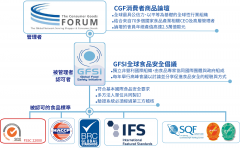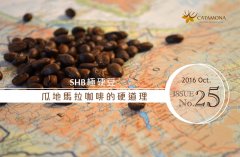Talk about the certification of │ CATAMONA's peace of mind food assurance ─ halal verification

Professional barista communication, please pay attention to coffee workshop (Weixin Official Accounts cafe_style
Among the three major religions in the world, Islam has the most extensive legal restrictions,
There are detailed regulations on war, finance, welfare and even food and drink life.
For Muslims, only food that has passed "halal certification" can be safely consumed.
CATAMONA's Safe Food Guarantee-Halal Certification
About Halal Verification
According to the latest statistics, Islam has 1.57 billion followers in the world, accounting for more than 23% of the world's population, of which more than 1 billion Muslims live in South Asia and Southeast Asia, so the Islamic verification is mainly in Asia. The so-called "halal", in Arabic, means "legal"; and "halal food certification" means "food certification strictly carried out in accordance with Islamic rules"-from food raw materials to production, processing, handling, transportation, storage and sale, etc., must comply with Islamic teachings in order to be safe for Muslims to eat.
Among the details of Islamic diet, food hygiene is the most important. Countries with a majority Muslim population, such as Indonesia, Malaysia and other countries, must have halal verification when importing food. For Muslims or non-Muslims, as long as there is halal verification LOGO on the product packaging, there will be a certain degree of safety guarantee.
Apply for Halal Certification
Halal certification is usually conducted by local Muslim organizations in cooperation with official and unofficial experts and scholars. This verification is carried out for the products of the enterprise, not for the enterprise itself. For example, Katamona's "full range of products" is verified by the Taiwan Halal Association.
1. preliminary review
Application and information assessment to co-organisers
2. audit
Inspectors from all co-organizers went to the production site for actual inspection
3. Review Conference
Review of resolutions by document examiners, auditors, sharia commissioners and technical commissioners
4. issued
After the examination, the notary witnesses the signing and the certificate is issued
5. tracking
Unscheduled factory inspections and halal education training courses
Halal validation prospects
Although Muslims are a minority in Taiwan, with the frequent economic and trade exchanges between Taiwan and Islamic countries in recent years, the demand for halal certification has also increased. At present, the annual output value of the global halal market is estimated to be between 80 million and 1.2 trillion US dollars, which has attracted nearly 400 enterprises in Taiwan to obtain halal certification. It has also prompted more catering enterprises to choose to integrate with the international market, hoping to provide consumers with peace of mind and at the same time, it can also enter the international market at one stroke through the halal market, and serve customers from different cultural backgrounds in a more comprehensive way.
Halal certified food protection for consumers
The ingredients and production equipment conform to Islamic purity requirements
No contact with or proximity to unclean objects during manufacturing and storage
Packaging and containers comply with Islamic regulations
Raw materials used by manufacturers and materials supplied by suppliers and contractors are Islamic compliant
The manufacturing process is in accordance with Islamic regulations
Food is manufactured, processed and distributed cleanly and free of non-halal ingredients
Transportation vehicles carry only halal food (production lines must not have cross-contamination)
Equipment, manufacturing areas and environments are clean and the plant is GMP compliant
Important Notice :
前街咖啡 FrontStreet Coffee has moved to new addredd:
FrontStreet Coffee Address: 315,Donghua East Road,GuangZhou
Tel:020 38364473
- Prev

Talk about the in-depth introduction of certification │ FSSC 22000
Before introducing FSSC 22000, we first introduce you to two of the most important organizations in the global food industry. Through a clear diagram, you can more effectively support and illustrate the international versatility and credibility of FSSC 22000 certification. CGF consumer goods
- Next

SHB extremely hard beans │ Guatemala Coffee
Communication of professional baristas please follow the coffee workshop (hard Truth Coffee of cafe_style Guatemalan Coffee, official account of Wechat), which is Guatemala's main export, because it is even rated as the best coffee in Central America by coffee gluttons because of its high quality, rich natural acidity and balanced mellowness, which makes other coffee producing areas in Central America pale in comparison. Guatemalan coffee has always been the beginning of coffee.
Related
- Does Rose Summer choose Blue, Green or Red? Detailed explanation of Rose Summer Coffee plots and Classification in Panamanian Jade Manor
- What is the difference between the origin, producing area, processing plant, cooperative and manor of coffee beans?
- How fine does the espresso powder fit? how to grind the espresso?
- Sca coffee roasting degree color card coffee roasting degree 8 roasting color values what do you mean?
- The practice of lattes: how to make lattes at home
- Introduction to Indonesian Fine Coffee beans-- Java Coffee producing area of Indonesian Arabica Coffee
- How much will the flavor of light and medium roasted rose summer be expressed? What baking level is rose summer suitable for?
- Introduction to the characteristics of washing, sun-drying or wet-planing coffee commonly used in Mantenin, Indonesia
- Price characteristics of Arabica Coffee Bean Starbucks introduction to Manning Coffee Bean Taste producing area Variety Manor
- What is the authentic Yega flavor? What are the flavor characteristics of the really excellent Yejasuffi coffee beans?

